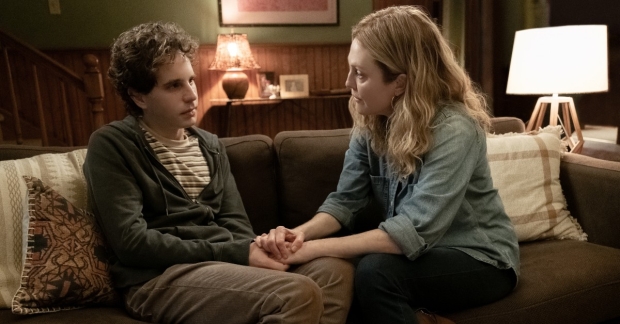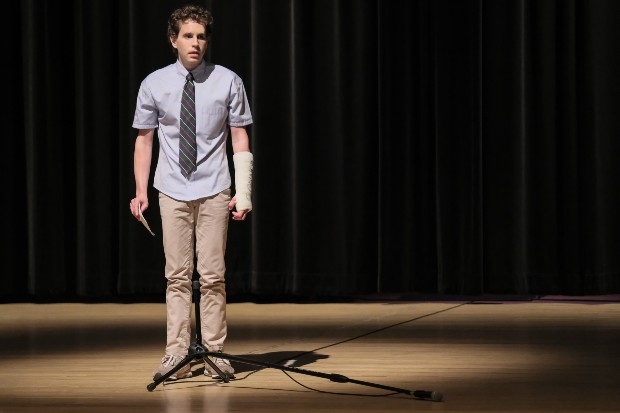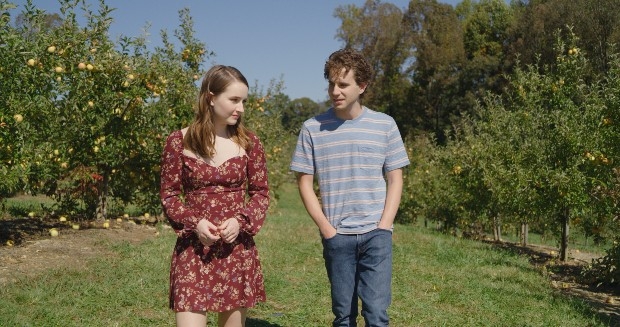Review: Dear Evan Hansen Movie Is So Drab, So Banal
Ben Platt stars in the cinematic adaptation of the stage show that launched his career.

(© Erica Doss/Universal Pictures)
Of all the movie-musicals to come out this year, a surprisingly long list that includes In the Heights, Everybody's Talking About Jamie, and the forthcoming West Side Story, the buzz around the motion-picture adaptation of the Tony-winning musical Dear Evan Hansen has been practically nonexistent. The trailer was released without much fanfare. The promotion, thus far, has been minimal. It's almost like Universal is trying to sweep Dear Evan Hansen gently under the rug, a tactic that I didn't quite comprehend before I saw it, and which I deeply understand now having experienced it.
Scripted by Tony-winning book writer Steven Levenson, directed by Stephen Chbosky (The Perks of Being a Wallflower), and featuring a slimmed down song list by Tony winners Benj Pasek and Justin Paul, Dear Evan Hansen is a dense musical about a white lie that spins out of control, the role of technology in the perpetuation of false narratives, the power of forgiveness, and the struggle so many people have with mental health. Evan (Ben Platt, reprising his Tony-winning performance) is an anxiety-ridden high school kid whose therapist encourages him to write motivational letters to himself every day. One of them, detailing his secret crush on school chum Zoe Murphy (Kaityln Dever, in the film's most believable turn), is intercepted by her loner brother Connor (Colton Ryan, a little too sweet), who subsequently kills himself.
Desperately searching for answers and thinking it's a suicide note addressed to their son's secret friend Evan, Connor's parents (Amy Adams and a distracted Danny Pino) welcome this unexpected guest into their lives, and Evan doesn't stop them, going to great lengths to prove their "friendship," while courting their daughter and figuring out how to come out of his shell. Of course, this fib balloons into a viral sensation about hope and perseverance when social outcast Alana (Amandla Stenberg, operating in a different, probably better, film) decides to start a suicide prevention foundation in Connor's name.

(© Erica Doss/Universal Pictures)
Onstage, it's a tearjerker: a wrenching grief story for the grownups, and a generally frank examination of psychological issues that aren't really addressed in mainstream media to its plethora of young fans. It strains credulity, sure, but that artifice of the proscenium (and the radio-ready pop score) carries it. We know it's not real, but we go with it anyway, and it provides a nice little catharsis amid the moral gray area as we buy the cast album on the way out.
Film is a different story – it's "real" real. Evan's actions, which we sort of shrug off after seeing it on Broadway because they're presented with hints of ambiguity, are truly grotesque in celluloid. He's a Machiavellian villain in a story where he's written to be the hero.
This push-and-pull between hero and villain would have been a more thoughtful reexamination of the show for the screen if the creative team wanted to put in the work, but instead they've given us a generally straightforward adaptation, which, to paraphrase one of the songs, is so drab, so banal, and desperately in need of editing (even with four songs cut, it clocks in at a staggering two hours and 17 minutes, which is almost longer than the stage version).
Through excising songs like "Anybody Have a Map?," "Good for You," and "To Break in a Glove," Levenson neuters the roles of the adults down to almost nothing, a shame when you have fine actors like Adams and Julianne Moore, who plays the barely-there role of Evan's working mom, doing their best to find characters with extremely little. Moore, in particular, does well with the ostensible eleven o'clock number, "So Big, So Small," but the pathos is blunted by the lack of screen time – it doesn't earn it on screen the way it does on stage. From opening the film with "Waving Through a Window" to the new (unnecessary) number for Alana ("The Anonymous Ones," co-penned and sung by Stenberg) this has been refashioned entirely as a teen story, devoid of really anything that gave it dramatic heft.

(© Universal Pictures)
There are aspects of Chbosky's cinematic expansion that work extremely well in a grim way – "Sincerely Me," where Evan and his friend Jared (Nik Dodani, doing his best Will Roland impression) create the fake emails from Connor, becomes a colorful spectacle at an arcade, while Zoe almost crashes her car with frustration during "Requiem." These moments excellently accentuate the piquant nature of the script, while the rest of it is created with a doe-eyed sincerity that goes against the darker hues. A new denouement, which is supposed to not let Evan off the hook so easily but involves him once again using Connor for his own means, is particularly repellant.
As for Platt, he's too old and his hair's a mess, but the film is actually a pretty good representation of what he did on Broadway, capturing the from-the-gut performance and impressive vocals that launched his career into the stratosphere. What it lacks, no fault of his own, is subtext. It's clear he understand what he's doing, but Chbosky never allows us to understand Evan's motivation. Without grounding his actions, Evan is just a monster, which is clearly not what they want us to walk away thinking.
This could be a metaphor for the film of Dear Evan Hansen itself. Words fail, indeed.









